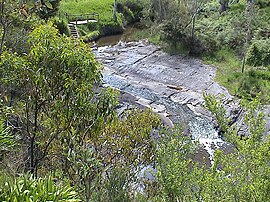Hundred of Yankalilla
|
Hindmarsh South Australia |
|||||||||||||
|---|---|---|---|---|---|---|---|---|---|---|---|---|---|

Glacier "Selwyn" Rock formation beside the Inman River at Inman Valley in the Hundred of Encounter Bay
|
|||||||||||||
| Coordinates | 35°26′S 138°38′E / 35.43°S 138.64°ECoordinates: 35°26′S 138°38′E / 35.43°S 138.64°E | ||||||||||||
| Established | 1842 | ||||||||||||
| Area | 2,650 square kilometres (1,025 sq mi) | ||||||||||||
| LGA(s) |
Alexandrina Council Mount Barker District Council City of Victor Harbor Yankallilla District Council |
||||||||||||
|
|||||||||||||
| Footnotes | Coordinates Adjoining counties |
||||||||||||
The County of Hindmarsh is one of the 49 counties of South Australia. It was proclaimed by Governor George Grey in 1842 and named for Governor John Hindmarsh.
It extends from the Fleurieu Peninsula in the southwest to the Murray Mouth in the southeast to Point Sturt on the Sturt Peninsula and the course of the Bremer River in the east, Mount Barker in the north and Sellicks Hill on the Gulf St Vincent coastline in the northwest including the southern end of Mt Lofty Ranges, Hindmarsh Island, Mundoo Island and part of Lake Alexandrina. This includes the following contemporary local government areas:
The following hundreds have been proclaimed within the county - Encounter Bay, Goolwa, Kondoparinga, Macclesfield, Myponga, Nangkita, Waitpinga and Yankalilla in 1846, Strathalbyn in 1850, and Alexandrina and Bremer in 1851.
The County of Hindmarsh is divided into the following hundreds:
The Hundred of Alexandrina (35°27′06″S 138°57′07″E / 35.451580°S 138.951890°E) was proclaimed on 7 August 1851. It covers an area of 200 square kilometres (76 sq mi) and is named after the lake partially located within the county and which is known as Lake Alexandrina. It includes the following localities - Clayton Bay, Point Sturt and parts of Finniss, Lake Alexandrina and Milang.
...
Wikipedia

